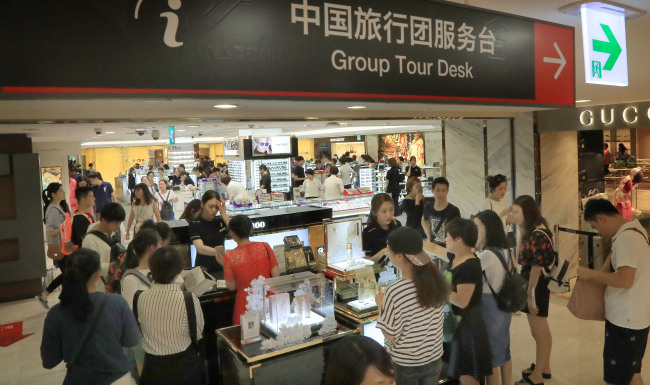South Korean firms in entertainment, tourism, cosmetics and other sectors that rely on the Korean Wave could suffer from growing anti-Korean sentiment in China over Seoul’s decision to deploy the U.S.-led Terminal High Altitude Area Defense system, analysts and insiders here said Friday.
The possibility of China imposing trade sanctions against Korean firms officially is quite low, considering the country’s status as the world’s second-largest economy, they said.

This Aug. 1 photo shows Chinese tourists purchasing Korean cosmetics products at Lotte Duty Free Store in Myeongdong, central Seoul. (Yonhap)
However, Korean firms, particularly those who are using Korean pop culture as a marketing tool should keep monitoring the situation. China won’t take an official step to hamper their business. Instead, it could attempt to derail the popularity of Korean Wave, or hallyu, a powerful measure that could disrupt Korean firms’ business there.
“China has become an economic superpower and, unlike the past, it is not in a position to impose trade sanctions against a country in an apparent retaliation anymore,” said Kim Eun-young, senior researcher at Emerging Market Research Dept. of Institute for International Trade under Korea International Trade Association in Seoul.
She added that the neighboring country is a member of the World Trade Organization, and abided by international law.
“But South Korean firms should closely watch the situation as China could possibly attempt to raise anti-Korean sentiment by using the local media and constrict the consumers’ desire to buy Korean products,” she said.
Such comments came amid reports circulating in China and South Korea that Beijing has banned hallyu stars from visiting the country. A slew of entertainment programs under joint production projects could be also canceled due to the escalating political tension between the two countries, according to reports.
Some suggest the worst-case scenario that China could ban their people from visiting Korea, in order to have massive, damaging effect on the country’s tourism sector. The spending by Chinese tourists in Korea accounts for 40 percent.
Cosmetics companies are likely to suffer the most as they have been expanding exports due to buying power of Chinese consumers.
AmorePacific, for instance, expanded its share in skin care category in Chinese market from 0.7 percent in 2009 to 2.8 percent in 2015, according to a recent data.
Shares of AmorePacific shed 2.95 percent to 362,000 won Friday, and its rival LG Household & Healthcare fell 4.88 percent to 916,000 won.
Some Korean firms expressed concerns about possible trade retaliation from China, but said there‘s no immediate impact for now.
“We are aware of rumors circulating in China. But they are only unconfirmed matters. There are no particular damages reported at the moment,” said Lee Kyung-min, spokeswoman of AmorePacific in Seoul.
By Cho Chung-un (christory@heraldcorp.com)






